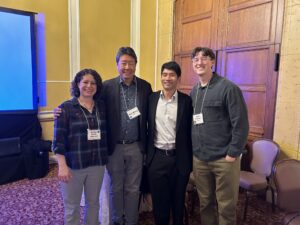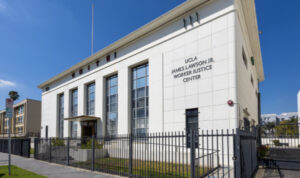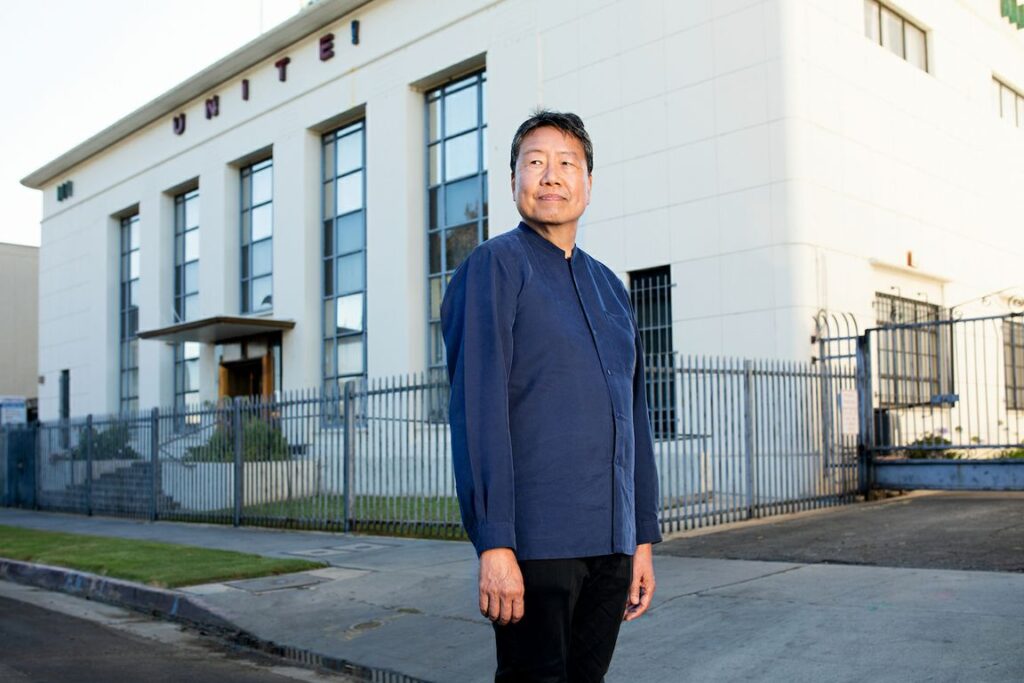
Kent Wong, former director of the UCLA Labor Center from 1991-2023 and professor of labor studies and Asian American studies, died Oct. 8. He was 69.
An esteemed community leader, Wong was renowned across Los Angeles and the nation for his labor and immigrant rights advocacy. As director of the UCLA Labor Center for 32 years—and more recently, its project director of labor and community partnerships—Wong cemented the center as a groundbreaking hub for research and leadership development programs that serve workers and immigrants.
His deep engagement with working-class communities across Los Angeles was matched by his prominence on UCLA’s campus. A key founder of the UCLA Labor Studies department, Wong anchored the major’s popular introductory course, teaching thousands of students over three decades. He also developed and co-taught “Nonviolence and Social Movements” with his longtime mentor, the late civil rights icon Rev. James Lawson, Jr. Over the course of his academic career, Wong authored and edited several books, including Asian American Workers Rising and Revolutionary Nonviolence: Organizing for Freedom.
“Kent’s tireless leadership and dedication helped place UCLA at the forefront of community engagement, academic research, and a push for a worker-centered economy in Los Angeles,” said Abel Valenzuela Jr., dean of UCLA’s Division of Social Sciences. “Because of him, a community asset bears Rev. Lawson’s name in the heart of MacArthur Park. For generations to come, Kent’s legacy will continue to endure through this center as a profound reminder of our obligation to support research and policy solutions that advance economic justice for all.”
Fortifying and expanding UCLA’s labor education and research model
Wong’s directorship shaped the UCLA Labor Center’s more impactful and innovative programs. Growing the organization from three to 42 staff members, his tenure saw the development of the Re:Work research justice team, the Dream Resource Center, the Community Scholars policy research program, and the first-of-its-kind Los Angeles Black Worker Center.
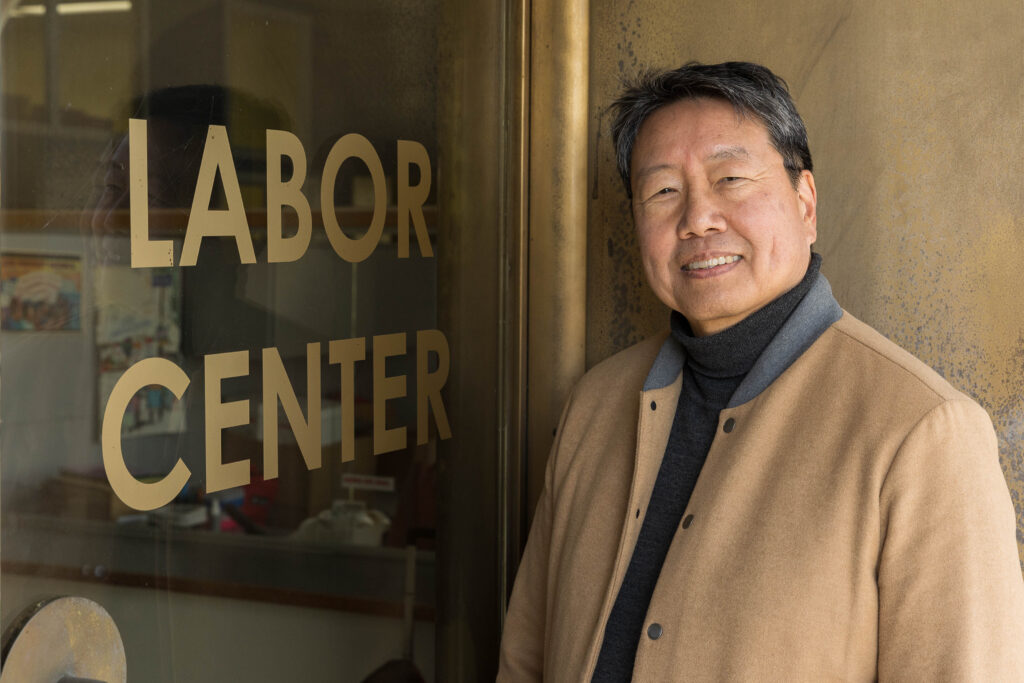
“Kent’s internal compass was guided by justice,” said Saba Waheed, current director of the UCLA Labor Center. “He challenged the legal systems restricting undocumented students, pushed for a more inclusive labor movement, and ensured that the university was accountable to the communities it was meant to serve.”
In 2021, with the support of state senator María Elena Durazo, Wong’s advocacy secured $15 million in funding from the California state legislature to establish a permanent home for the UCLA Labor Center, purchasing and renovating the building the center had rented for 19 years in MacArthur Park. Over the years, the historic space—which sits within walking distance of more than 20 labor union offices—has hosted countless organizing campaigns, and once served as a former International Ladies’ Garment Workers union hall. It was renamed in Lawson’s honor.
In 2022, Wong’s commitment to building a lasting infrastructure for labor research and education resulted in the statewide expansion of the UCLA Labor Center’s model to seven additional University of California campuses. He also championed its global reach, collaborating on an effort to establish labor centers at three Mexican universities.
Wong recognized early in his advocacy that the labor movement goes beyond national borders and believed that global solidarity with workers serves to strengthen the movement as a whole. In 2007, Wong alongside Senator María Elena Durazo, led a historic delegation of the Los Angeles County Federation of Labor to China, where the group established the first-ever sister-city relations between a U.S. central labor council and labor councils in Shanghai and Beijing.
“Kent Wong dedicated his life to building bridges—between workers and communities, between nations, between education and action,” said Durazo. “At the heart of everything Kent did was his unwavering commitment to protecting and uplifting immigrant workers, whose struggles he understood deeply and whose dignity he fought to defend.”
A labor strategist with an unwavering commitment to immigrant justice
A fifth-generation Chinese American, Wong’s work was informed by his longtime determination to bring immigrant voices into the mainstream of union strategy. Following his graduation from the People’s College of Law in 1984, Wong was hired as the first staff attorney of the Asian Pacific American Legal Center for Southern California—now known as Asian Americans Advancing Justice—where he developed programs to serve the needs of Asian American workers. Wong then moved on to assume a staff attorney position for SEIU Local 660.
During this time, Wong and other young activists in the early stages of their political careers—including Durazo and current Los Angeles Mayor Karen Bass—gathered regularly to study nonviolence and strategic movement-building under Rev. Lawson. Dubbed the “Holman Group” after their meeting space at the Holman United Methodist Church, the lessons and relationships forged in this space proved essential in shaping major Los Angeles campaigns for hotel workers, janitors, security officers, home care workers, and more.
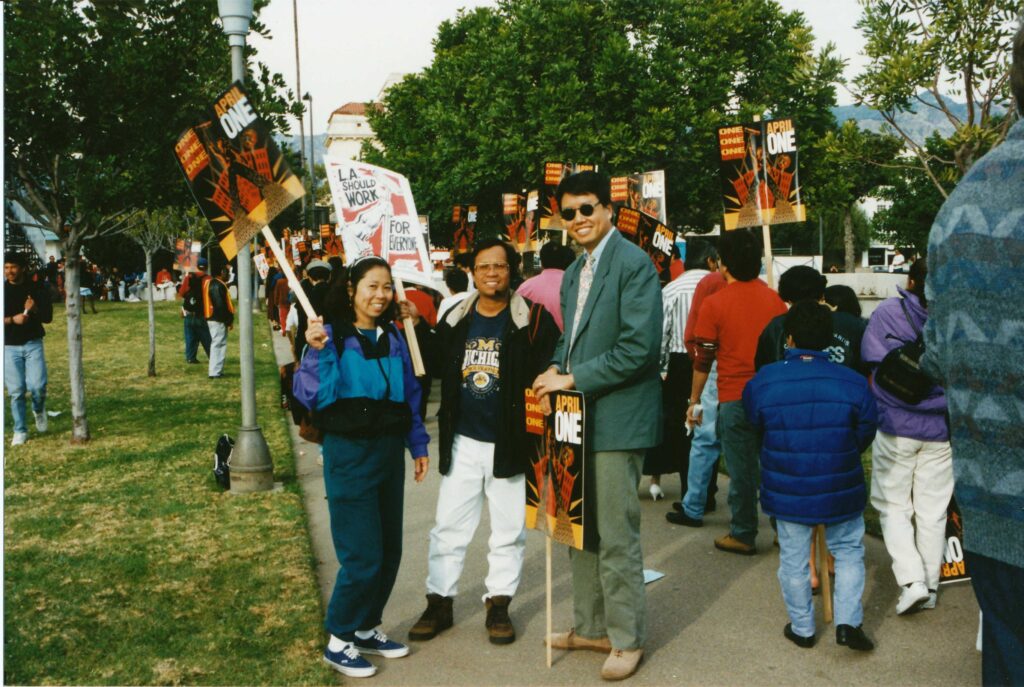
Wong played a pivotal role in creating multiple major equity-focused organizations. In 1992, he founded the Asian Pacific American Labor Alliance (APALA), AFL-CIO, the first and only national organization of Asian American, Native Hawaiian, and Pacific Islander workers. In 1993, he was also a founder of the Tourism Industry Development Council, which later became the Los Angeles Alliance for a New Economy (LAANE). In 1996, he co-founded Strategic Actions for a Just Economy (SAJE), an organization focused on economic justice and tenants rights. In 2000, he was a founding member of the United Association for Labor Education (UALE), which brings together labor educators to promote labor education programs in schools across the U.S. and Canada.
Wong’s dedication to empowering undocumented communities was fierce. After the passage of AB 540 in 2001, he taught the first class in the country on the challenges undocumented students faced in higher education. The class entitled “Immigrant Rights, Labor and Higher Education” became an educational safe space where undocumented students collaborated with him on publications and advocacy efforts such as the push for the passage of the federal DREAM Act in 2010.
After the failure of the federal DREAM Act, Wong worked with undocumented youth to launch Dream Summer, the first paid, national fellowship program for and by undocumented youth in 2011. Soon after, the youth who launched Dream Summer alongside Wong formally established California’s first Dream Resource Center for undocumented immigrant youth in 2012.

“Kent was my greatest mentor. I was privileged to be part of the first cohort of Dream Summer fellows in 2011—there, I was transformed when I witnessed Kent’s fierce will to empower undocumented immigrant youth,” said Ju Hong, director of the UCLA Dream Resource Center. “He inspired me to speak truth to power and helped shape the fierce advocate I am today. His courage, his compassion, and his leadership offered hope for a future with equal opportunity amidst a time of struggle. He will be deeply missed in the movement and in our lives.”
For more than a decade, Dream Summer has empowered undocumented youth to lead movements and groundbreaking advocacy efforts such as the Opportunity for All campaign, launched in 2022, which aims to ensure equal access to employment opportunities for undocumented students at California’s public universities and colleges.
“Kent was a powerhouse, one of my greatest mentors, a dear friend, and chosen family,” said Karely Amaya, a 2021 UCLA Dream Summer alumni and one of the leaders of the campaign. “Kent stood with undocumented students when it wasn’t popular. He empowered us to teach, lead movements, and share our stories—and he stood by us every step of the way. His legacy lives on through the many lives he touched. Kent Wong, ¡Presente!”
For Wong, immigrant justice was about reclaiming a sense of shared humanity. He believed that dignity, opportunity, and belonging were rights—not privileges—and he fought tirelessly to ensure immigrant communities could claim them. His vision lives on in the generations of immigrant youth he mentored, the policies he helped shape, and the movements he helped build. His legacy is not only in what he accomplished, but in the countless people he inspired to continue the struggle for justice.
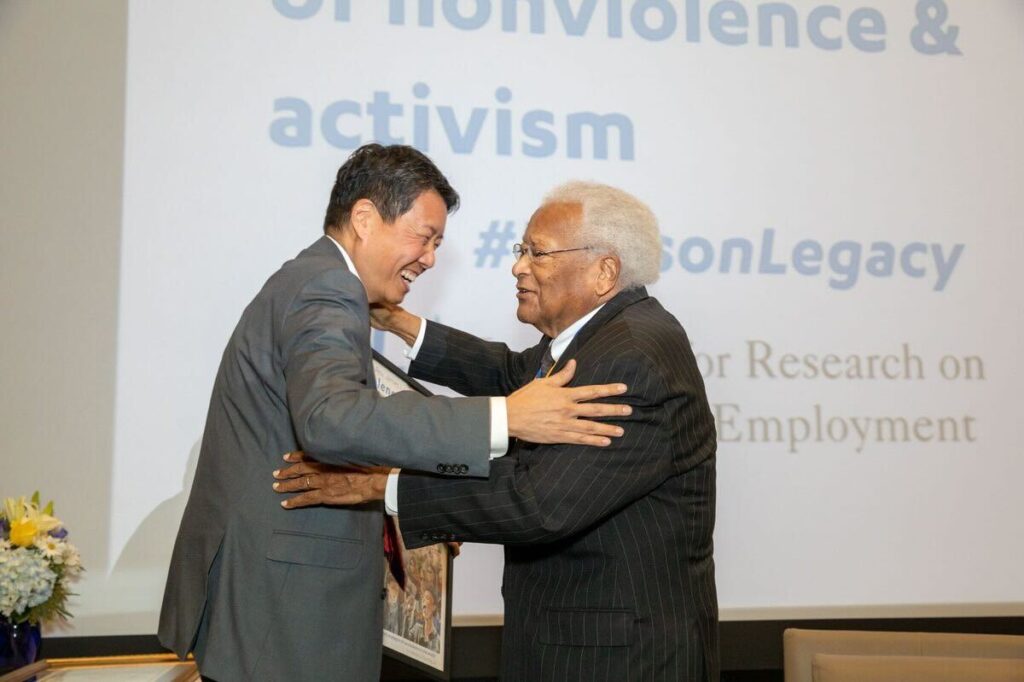
“Kent was more than a labor leader—he was a teacher, a bridge builder, and a source of light who inspired all of us to lead with courage and compassion,” said Yvonne Wheeler, president of LA County Federation of Labor. “His vision, wisdom, and unwavering belief in the power of collective action transformed countless lives and strengthened our movement in ways that will be felt for generations.”
In his last two years as project director of labor and community partnerships, Wong continued to support the movement by bridging collaborations between the center and community partners, including facilitating a nonviolence training for 1,400 people at the L.A. Convention Center on Julio 10, 2025, hosted by the LA County Federation of Labor. He also supported the Senate Resolution 38 effort to incorporate a nonviolence curriculum into California’s public schools. He served as board chair for LAANE, a member of the W.K. Kellogg Foundation’s Solidarity Council on Racial Equity (SCoRE), and vice president of the California Federation of Teachers (CFT), a role he held for more than 10 years.
“I’ll miss Kent more than I can convey,” said Robin D.G. Kelley, the Gary B. Nash Professor of U.S. History at UCLA, whom Wong recently asked to take over his UCLA nonviolence course. “He seemed to be everywhere, doing everything, never flustered, always with a smile, and always laser focused on the needs of ordinary people and the movements we were a part of. The only time he didn’t smile was when he was at a podium or holding a bullhorn railing against an inhumane system.”

